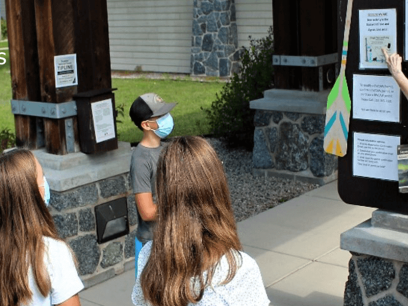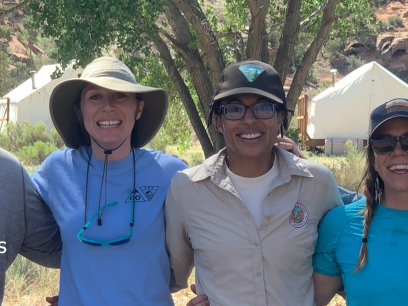
WASHINGTON, DC—The National Environmental Education Foundation (NEEF) is proud to announce the awardees of the 2021-2022 NEEF Greening STEM Grant.
This is the second round of grants provided under a collaboration between NEEF and two of its federal partners: the Bureau of Land Management (BLM) and the USDA Forest Service (FS). Both organizations previously worked with NEEF to fund Greening STEM Demonstration Projects during the 2019-2020 school year using components of NEEF's Greening STEM model to design and deliver STEM programming.
“We are thrilled to be working again with our federal partners at the Bureau of Land Management and the USDA Forest Service,” said Robert Sendrey, program director for K-12 environmental education at NEEF. “Their continued investment in environmental education using Greening STEM will help make environmental challenges and issues more accessible, relevant, and connected to students' daily lives while introducing them to potential career opportunities in the field of STEM.”
Programming funded by these grants will utilize STEM-focused content, instructional strategies, training approaches, and collaboration and dissemination technologies to assist school educators and staff in implementing and enhancing learning in and outside of the classroom.
Following project completion, all resources and related content developed under these grants will be made available via NEEF's Greening STEM Hub. For examples of successful past projects, check out NEEF's collection of project videos and educational resources.
The following projects have been selected to receive Greening STEM grant funding:
Bureau of Land Management
Middle School Fire Ecology
Nonprofit Partner: Greater Arkansas River Nature Association
School Partners: Salida Middle School, Salida, CO; Buena Vista Middle School, Buena Vista, CO
Students in rural western Colorado will engage in hands on experiential learning activities that cover topics such as why they should be invested in wildland fires, the different characteristics of fire, how it affects the flora and fauna, bringing balance back into affected areas, as well as fire safety on a personal and local level.
These activities offer a variety of methods for data seeking and experimentation while driving home key points about fire ecology and safety such as identifying Colorado's red zones, creating dioramas, analyzing authentic fire charts to pull data, as well using visual models to observe the effects of fire. Collaboration with BLM will also allow students to gain critical exposure to career pathways in public land agencies.
McInnis Canyons National Conservation Area Greening STEM Extension to Middle School
Nonprofit Partner: Colorado Canyons Association
School Partner: School District 51, Grand Junction, CO
This is a continuation of a previous Greening STEM project at McInnis Canyons National Conservation Area in 2020 where local high school students participated in an overnight river trip in 2020 to learn about biological control of invasive species at an outdoor education site in partnership with Colorado Canyons Association, BLM, and the Palisade Insectary.
This grant continuation will increase the reach of this project by developing materials that can be used by other grade levels, such as a video tour of the Palisade Insectary, as well as improve monitoring deliverables to the BLM. In addition, high school participants will have the opportunity to present their experience and results to younger students, increasing their interest in and exposure to natural resource careers.
USDA Forest Service
Greening STEM for Gilbert Stuart Middle School
Nonprofit Partners: Rhode Island Resource Conservation and Development Council; Northern Rhode Island Conservation District, Johnston, RI
School Partner: Gilbert Stuart Middle School, Providence, RI
This project will provide students with a thorough introduction to the field of Urban Forestry, including tree identification, site selection, planting, care, and inventory. Over the course of five months in early 2022, staff from the Northern Rhode Island Conservation District, Rhode Island Resource Conservation and Development Council, and the Forest Service will teach students basic principles of tree care and identification, how to select a site for a tree planting, how to plant a tree on their school grounds, and how to conduct an inventory of the trees on their school grounds to identify trees in need of care. They will then present a tree care plan to the students in their class, staff members involved in the program, and invited decision makers from the school and community.
Supplementary curriculum developed during this project will be made available to other school districts throughout the country and will augment the Forest Service's available resources to include hands-on citizen science options centered in urban forestry for middle and high school students. These resources will allow students who cannot easily access a Forest Service property to participate in scientific exploration consistent with Greening STEM program goals and to gain an appreciation of the important role that trees play in their own neighborhood.
Creating River Stewards: Monitoring Water Quality on Public Lands
Nonprofit Partner: South Yuba River Citizens League
School Partners: Downieville Jr./Sr. High School, Downieville, VA
This project will equip high school students with the tools they need to become citizen scientists by: training them in water quality monitoring practices; teaching them to apply these skills in teams at a nearby and popular river crossing on Tahoe National Forest land; helping them interpret the data they collect and compare it to existing water quality monitoring results to better understand various impacts on water quality, including increased visitation, rain events, and drought; and teaching them river etiquette and the tools they need to become River Ambassadors.
The proposed project includes four components: an in-classroom preparatory lesson, field day, post-activity lesson, and final presentations.
El Yunque National Forest Science and Conservation Trail: Citizen Science Program
Nonprofit Partner: Fundación Amigos de El Yunque
School Partner: Carmen Feliciano Carreras Public School, Palmer, Rio Grande, Puerto Rico
This project will bring local public school students to travel to El Yunque National Forest, where they will participate in the restoration of the Science and Conservation Trail, learn about forest ecology and ecosystem services, contribute to its management objectives, and experience the local habitat—for many, their first time in the forest.
Project activities will increase students' critical thinking, problem-solving, communication, and leadership skills. It will also help them understand the management and value of natural resources by managing scientific data, promoting teamwork, and reinforcing their skills to work with natural resources. Local educators will also have the opportunity to train in forest management concepts and experience nature-based education as an alternative to traditional education.

